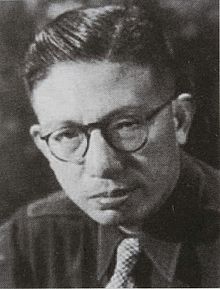Wu Yonggang
Wu Yonggang ( Chinese 吴永刚 , Pinyin Wú Yǒnggāng ; born November 1, 1907 in Jiangsu Province , † December 18, 1982 ) was a Chinese film director and screenwriter.
He started working for the film at the age of 19. The director Shi Dongshan discovered Wu and trained him to be a production designer. In 1931 Wu went to the newly founded film company Lianhua , where he was involved in the production of the Bu Wancang films Sange modeng nü xing (Three Modern Girls) and Muxing zhi guang (Maternal Radiance) in 1933 .
With his directorial and screenplay debut - The Divine (Shen nü) (1934) with Ruan Lingyu in the lead role - Wu Yonggang achieved success with critics and audiences. The film is considered an outstanding example of the socially critical Chinese art cinema of the 1930s. Shen nü is the highest-ranked silent film in the list of the 100 best Chinese films of all time, compiled by film experts and published at the 2005 Hong Kong Film Awards .
In addition to the humanistic psychodrama Lang tao sha (Waves Washing the Sand) (1936) with the star Jin Yan , Wu Yonggang also made patriotic films such as The Pioneers (1936), in which shortly before the start of the Sino-Japanese war on the unity of the Chinese and the armed struggle against foreign invaders is called.
In the years 1937 to 1941 his range of topics expanded to include entertaining films such as romances, costume dramas and action films. Wu went to Chongqing and worked for the Nationalist Central Film Studio. He made The Path to National Reconstruction , but the project was never completed. First, the lead actress Hu Die had to be replaced because she was having an affair with nationalist intelligence chief Dai Li , then almost all of the footage and equipment was lost due to a Japanese attack while filming the location. He directed several films in a short space of time immediately after the war, but only three in the 1950s: The Far Away Village (1950), which deals with land reform; Hasen and Jiamila (1952), who deals with ethnic problems; and the fairy tale film Qiu weng yu xian ji (Qiu Meets Goddess of Flowers) (1956).
In 1957, Wu Yonggang wrote an essay in which he criticized the state party's excessive control of the film industry. He was then branded as a right-wing man and was only able to make a film again in 1962, one of the popular non-political opera films of the time. After the Cultural Revolution , Wu Yonggang co- directed Bashan yeyu (Night Rain on the River) with Wu Yigong in 1980 . The film was named Best Picture at the 1981 China Golden Rooster Awards .
Wu Yonggang made about 30 films as a director.
Web links
- Wu Yonggang in the Internet Movie Database (English)
- Wu Yonggang in the Chinese Movie Database
- about the film Shennü ( Memento from July 14, 2013 in the Internet Archive ) (with photo by Wu Yonggang)
- all subtitles by Shennü in English (with still photos)
| personal data | |
|---|---|
| SURNAME | Wu Yonggang |
| BRIEF DESCRIPTION | Chinese film director and screenwriter |
| DATE OF BIRTH | November 1, 1907 |
| PLACE OF BIRTH | Jiangsu Province |
| DATE OF DEATH | 18th December 1982 |
